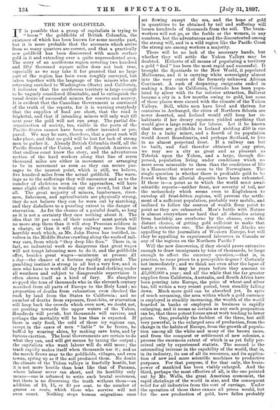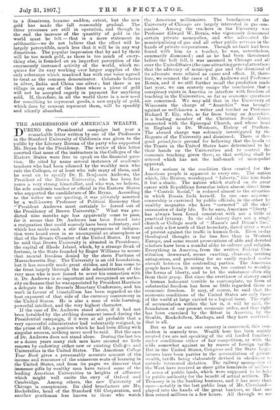THE NEW GOLDFIELD.
IT is possible that a group of capitalists is trying to " boom " the goldfields of British Columbia, the existence of which has been known for some months past, but it is more probable that the accounts which arrive from so many quarters are correct, and that a practically new goldfield has been discovered with much surface gold in it and extending over a quite unprecedented area. The story of an auriferous region covering two hundred and fifty thousand square miles does not look true, especially as we may take it for granted that no large part of the region has been even roughly surveyed, but taken together with the language of the miners who are returning enriched to Washington (State) and California, it indicates that the auriferous territory is large enough to be vaguely considered illimitable, and to extinguish the usual desire of successful miners for reserve and secrecy. It is evident that the Canadian Government is convinced of the truth of the reports, for it is warning everybody that the supplies of food are short, that the road is frightful, and that if intending miners will only wait till next year the gold will not run away. The partial dis- organisation of society, too, visible in the ports of the Pacific States cannot have been either invented or pre- pared. We may be sure, therefore, that a great rush will take place, and that no gold will be lost for lack of strong men to gather it. Already British Columbia itself, all the Pacific States of the Union, and all Spanish America on that endless coast know the story, and the adventurous section of the hard workers along that line of seven thousand miles are either in movement or arranging to be in movement as soon as they can secure pas- sages to the nearest point, which is still, we believe, five hundred miles from the actual goldfield. The warn- ings as to the sufferings they will encounter and as to the number of skeletons seen on the approaches, will have some slight effect in weeding out the crowd, but that is all. The great majority of miners, lumbermen, river- men, fishermen, and agriculturists are physically strong, they do not believe they can be worn out by marching, and they disbelieve to a puzzling extent in the danger of starvation. As for the chance of a painful death, so long as it is not a certainty they care nothing about it. The idea that 30 per cent. of their number must perish will no more stop them than it will stop Prussian soldiers in a charge, or than it will stop railway men from that horrible work which, as Mr. John Burns has testified, in- volves in the Middle States:crawling along the roofs of rail- way cars, from which "they drop like flies." There is, in fact, no industrial work so dangerous that great wages will not tempt labouring men to do it, and the goldfields offer, besides great wages—minimum at present .21 a day—the chance of a fortune rapidly acquired. The gambling instinct is strong in all but a very few, and in men who have to work all day for food and clothing under all weathers and subject to disagreeable supervision it often shows itself as a kind of fury. No slaughter stopped the tens of thousands who in the eleventh century marched from all parts of Europe to the Holy Land ; no proportion of deaths from exhaustion even checked the rush by land from the States to California; and no number of deaths from exposure, frost-bite, or starvation will keep back the crowds which even now, we doubt not, are pouring towards the upper waters of the Yukon. Hundreds will perish, but thousands will survive, and perhaps the mortality will be less than is expected. If there is only food, the cold of those icy regions can, except in the cases of men " liable " to be frozen, be baffled by wearing skins, by making cave huts, and by furious exertion. The local Governments are certain to do what they can, and will get means by taxing the output ; the capitalists who want labour will do still more; the track rapidly makes itself when thousands use it ; and as the march draws near to the goldfields, villages, and even towns, spring up as if the soil produced them. No doubt the climate of the Yukon valleys is fearfully hostile, but it is not more hostile than heat like that of Panama, where labour never ran short, and its hostility only means—one is ashamed to write such brutal sentences, but there is no discerning the truth without them—an addition of 10, 15, or 20 per cent. to the number of graves en route, which those who survive will not even count. Nothing stops human migrations once set flowing except the sea, and the hope of gold in quantities to be obtained by toil and suffering will loosen hundreds of thousands from the soil. The brain- workers will not go, or the feeble or the women, in any numbers, but the adventurous and the discontented among the strong will, and in a wild region like the Pacific Coast the strong are among workers a majority.
There will be no lack of the necessary hands, but whether they will settle the Yukon Valleys may be doubted. Hitherto of all means of populating a territory a gold " find " has been the most rapid and successful. It brought the Spaniards to the New World, it populated Melbourne, and it is carrying white sovereignty almost into the very centre of the formerly unknown African Continent. A rush of despairing emigrants ended in making a State in California, Colorado has been popu- lated by silver with its far inferior attraction, Ballarat became a city in a few months owing to gold, but none of these places were cursed with the climate of the Yukon Valleys. Still, white men have lived and thriven for centuries in Archangel, the cities of Northern Siberia are never deserted, and Iceland would still keep her in- habitants if her dreary expanses yielded anything that would give a large reward for labour. Let it be known that there are goldfields in Iceland yielding £50 in one day to a lucky miner, and a fourth of its population would desert Scandinavia, and perhaps Scotland, to live in an almost perpetual frost. If a railway can but be built, and fuel therefor obtained at any price, we may see a city as great and as pleasant as Tobolsk upon the Yukon, and a large, though dis- persed, population living under conditions which no more seem miserable to them than the conditions of life in a Hammerfest winter seem to the Norwegians. The single question is whether there is profitable gold to be found when the alluvial deposits have been exhausted.
If there is—a point as to which the world must await scientific reports—neither frost, nor severity of toil, nor the melancholy which seems even to Englishmen to envelop all frost-bitten regions, will prevent the settle- ment of a sufficient population, probably very mobile, and inclined to follow the sources of wealth from point to point as they are exhausted. Man's battle with Nature is almost everywhere so hard that all obstacles arising from hardship are overborne by the chance, even the distant chance, of getting gold sufficient to make that battle a victorious one. The descriptions of Alaska are appalling to the journalists of Western Europe, but will they be appalling to experienced labourers in Canada or any of the regions on the Northern Pacific ?
Will the new discoveries, if they should prove extensive enough to draw immigrants by tens of thousands, be large enough to affect the currency question,—that is, in practice, to raise prices to a perceptible degree ? Certainly not immediately ; and we think not even after the lapse of many years. It may be years before they amount to £5,000,000 a, year; and all the while that the far greater supplies from California, Australia, and South Africa have been pouring into Europe, the price of wheat and silver has, till within a very recent period, been steadily falling down. Much more gold can be absorbed yet. In spite of much screaming, the area within which a gold currency is employed is steadily increasing, the wealth of the world hoarded in banks or employed in business is rapidly enlarging, and. it seems as certain as any such proposition can be, that three potent forces are at work tending to lower prices. One, probably the feeblest of the three, but still very powerful, is the enlarged area of production, from the change in the habits of Europe, from the growth of popula- tion among all the white and many of the brown races, and from the conquest or settlement of new colonies, a process the enormous extent of which is as yet fully per- ceived only by experienced statists. The second is the astounding increase in the capability of the world, that is, in its industry, its use of all its resources, and its applica- tion of new and more scientific machines to productive purposes. For that purpose, if for that only, the brain- power of mankind has been visibly enlarged. And the third, perhaps the most effective of all, is the one pointed out by Mr. Wells, the great American economist, the rapid shrinkage of the world in size, and the consequent relief for all industries from the cost of carriage. Under the operation of these three causes all prices would, but for the new production of gold, have fallen probably to a disastrous, because sudden, extent, but the new gold has made the fall reasonably gradual. The three processes are still in operation, and though in the end the increase of the quantity of gold in the world must be felt — that is a mere statement in arithmetic—we do not believe that the effect will be largely perceptible, much less that it will be in any way disastrous. The popular impression that by and by there will be too much gold, as there is too much of every- thing else, is founded on an imperfect perception of the enormously increased activity of the world, which re- quires for its easy working ever larger supplies of the only substance which mankind has with one voice agreed to treat as the common denominator. Colorado believes in silver, India and China use silver ; but there is no village in any one of the three where a piece of gold will not be accepted eagerly in payment for anything sold. If, therefore, in all the world there is a new need for something to represent goods, a new supply of gold, which does by consent represent them, will be speedily and silently absorbed.







































 Previous page
Previous page